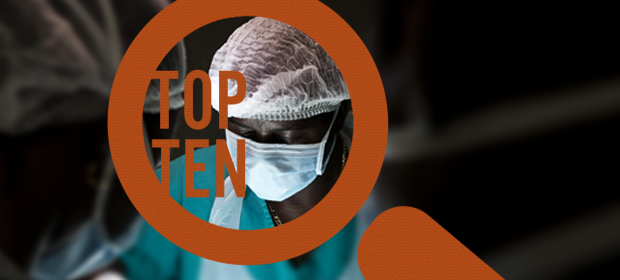Where We Work
See our interactive map


Mobile tech. Global health security. Cancer. We’ve got our eyes on 10 topics that will shape 2015 for many of us—especially the health workforce.
This post originally appeared in full on Humanosphere.
No one could have predicted that Ebola would dominate global health headlines in 2014. We sure didn’t. The virus was nowhere to be found on IntraHealth’s Top 10 Global Health Issues to Watch in 2014 published last January.
At the time, the global health community was focused on longstanding challenges such as HIV, family planning, maternal health—all of which have been derailed in some way by Ebola this year.
Will 2015 be some kind of a tipping point? Could it be the year the global health community finally begins to focus on the underlying health systems challenges brought to light by the Ebola epidemic? On the final push to end AIDS? On solving the critical shortage of health workers around the world?
Cancer kills more people in low- and middle-income countries than HIV, malaria, and tuberculosis combined.
All seven billion of us will be affected in some way by at least one of these issues. They’ll shape what IntraHealth and other global development organizations do in 2015, and how we do it. Here are our top ten predictions:
Child mortality, AIDS, maternal mortality—these and a handful of other issues have dominated the global health spotlight for years. But what about depression, post-traumatic stress disorder, dementia, substance abuse, and other mental health challenges that affect high- and low-income countries alike?“Mental health and well-being are fundamental to our collective and individual ability as humans to think, emote, interact with each other, earn a living, and enjoy life,” World Health Organization officials say.
Ethiopia is just one country that began focusing on mental health services in 2014, when it trained health workers to provide mental health care within prisons for the first time. As the civil unrest, economic instability, and traumatizing Ebola outbreaks of 2014 continue into 2015, mental health needs will only become more urgent—and so will the need for more trained social service workers, psychiatrists, and other health workers.
» The World Health Organization’s mental health action plan, 2013-2020
» Global Social Service Workforce Alliance
Results from the largest cancer study ever published—released last month by the Lancet—show that cancer kills more people in low- and middle-income countries than HIV, malaria, and tuberculosis combined.
“The reason that some countries lag behind is not surprising; it’s a matter of how much is invested in cancer care,” NPR reported on the study. “Dr. Corey Casper, head of global oncology at the Fred Hutchinson Cancer Research Center in Seattle, met a doctor in Uganda a few years ago who was then seeing 10,000 patients a year ‘in a facility that had…no roof, inconsistent electricity, and no meds.’ What’s more, says Casper, he was the only cancer doctor in Uganda and four surrounding countries.”
Cancer and other noncommunicable diseases will not get all the attention and resources they deserve in 2015, because Ebola will likely stunt global progress in addressing them this year. But they will continue to be a growing challenge for us all, including frontline health workers around the world.
» Your Odds of Surviving Cancer Depend Very Much on Where You Live» Global surveillance of cancer survival 1995–2009: analysis of individual data for 25,676,887 patients from 279 population-based registries in 67 countries
In 2014, UNAIDS announced its new fast-track strategy to end the AIDS epidemic by 2030.
“If the world does not rapidly scale up in the next five years, the epidemic is likely to spring back with a higher rate of new HIV infections than today,” officials from the UN agency said.
That’s partly because half of the 35 million people who live with HIV today don’t even know they’re HIV-positive, so they don’t know they’re in danger of passing the virus on to others. This year will mark the first full year of a global strategy designed to avert 21 million deaths over the next 15 years. Can it help us address AIDS as a chronic illness, and make HIV’s threat to public health a thing of the past?
What else is on the list? Read it here.
Psst: Want more top 10 lists? Read:
» IntraHealth's Top 10 Global Health Issues to Watch in 2014
» IntraHealth's Top 10 Global Health Issues to Watch in 2013
Get the latest updates from the blog and eNews




